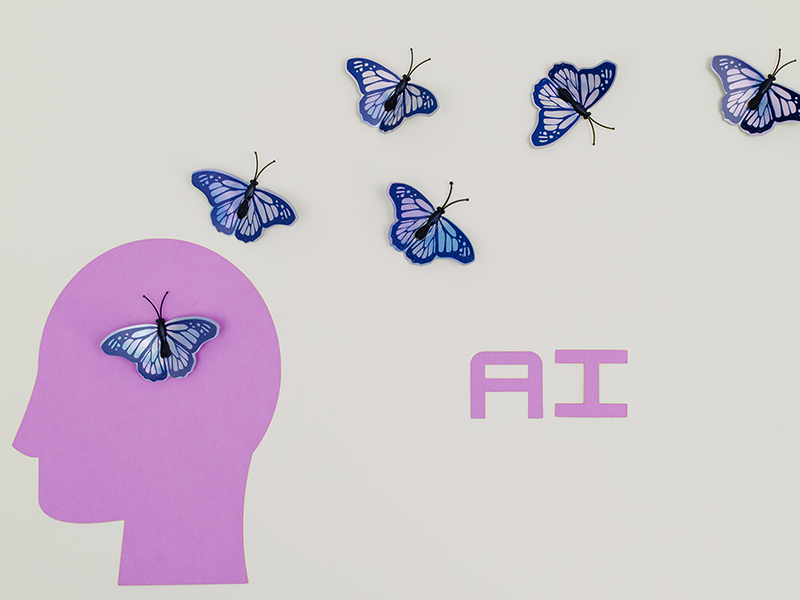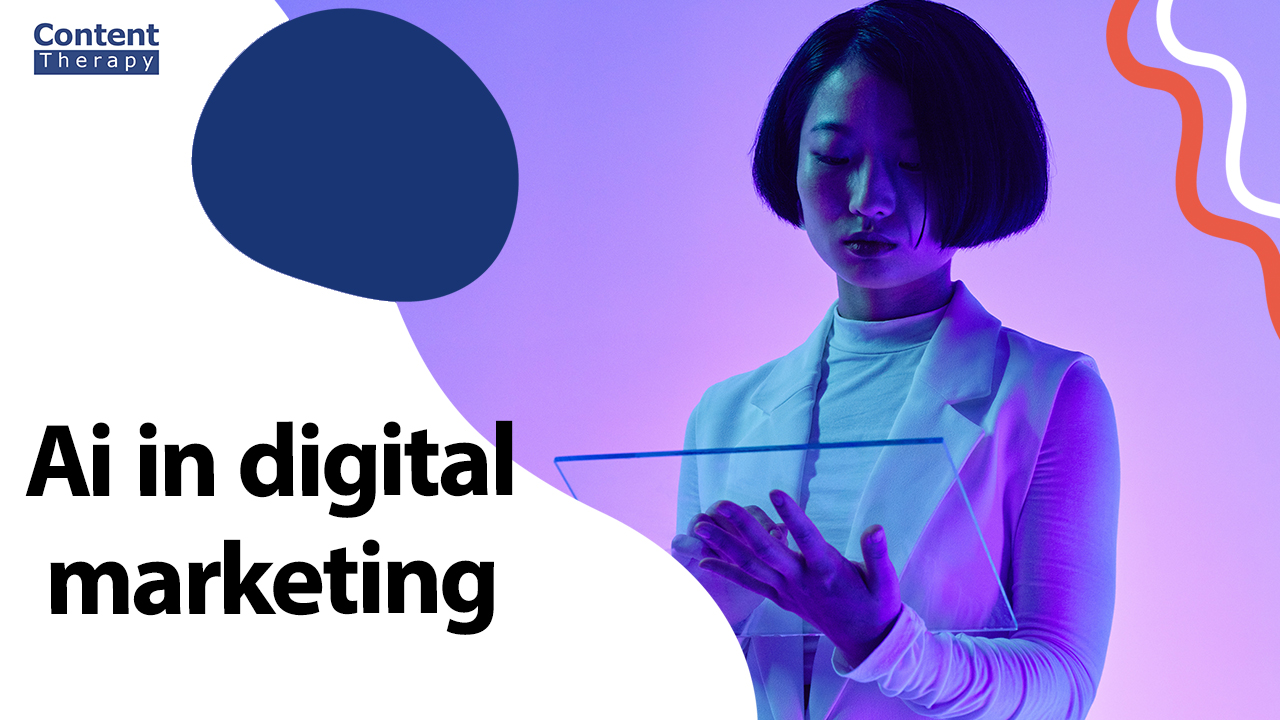As the world becomes increasingly digital, marketing strategies are also evolving to keep pace with the latest technological advancements. One of the most exciting and transformative technologies driving the evolution of digital marketing is artificial intelligence (AI). AI has the potential to revolutionize the way businesses engage with their customers, optimize their marketing efforts, and achieve their business goals. In this article, we will explore the ways in which AI is being used in digital marketing, the benefits it provides, and the potential it holds for the future of the industry.
Introduction to AI in Digital Marketing
Artificial intelligence (AI) has been a hot topic in recent years, and its impact is being felt across a wide range of industries. One area where AI is proving particularly transformative is in the world of digital marketing. AI-powered tools and techniques are being used to help businesses better understand their customers, personalize their marketing campaigns, and optimize their overall marketing strategies.

AI algorithms can analyze vast amounts of data in real-time and provide insights that were previously impossible to obtain. This can help marketers make more informed decisions, create more effective campaigns, and ultimately drive better results.
In this article, we will explore the ways in which AI is being used in digital marketing, including its benefits and potential drawbacks. We will also look at some of the key AI-powered tools and techniques currently being used by marketers, and examine the potential impact of AI on the future of digital marketing.
The Benefits of Using AI in Digital Marketing
The use of AI in digital marketing offers a multitude of benefits to businesses of all sizes. Here are some of the key advantages:
- Improved Customer Understanding: AI algorithms can analyze vast amounts of data to gain insights into customer behavior and preferences. This can help businesses better understand their target audience and create more effective campaigns that resonate with them.
- Personalization: AI-powered tools can help businesses create highly personalized experiences for customers, based on their browsing history, purchase behavior, and other data points. This can increase customer engagement and loyalty, leading to higher conversion rates and customer lifetime value.
- Enhanced Efficiency: AI algorithms can automate repetitive tasks, such as data analysis and reporting, freeing up marketers to focus on more strategic activities. This can improve efficiency and productivity, enabling businesses to achieve more with fewer resources.
- Improved ROI: By using AI-powered analytics tools, businesses can optimize their marketing spend and improve their return on investment (ROI). AI algorithms can identify the most effective channels, messages, and strategies for reaching and engaging customers, leading to higher conversion rates and revenue.
- Real-time Insights: AI algorithms can provide real-time insights into customer behavior, enabling businesses to react quickly to changing trends and preferences. This can help businesses stay ahead of the competition and remain agile in a fast-paced digital landscape.
In summary, AI-powered tools and techniques can help businesses improve their marketing effectiveness, enhance customer experiences, and achieve their business goals more efficiently.
Understanding AI-Powered Data Analytics
AI-powered data analytics is a key area where AI is making a significant impact on digital marketing. Traditional data analytics techniques rely on manual analysis and interpretation of data, which can be time-consuming and prone to human error. AI algorithms, on the other hand, can analyze vast amounts of data in real-time, identify patterns and trends, and provide insights that would be impossible for humans to detect.
AI-powered data analytics tools can help businesses extract valuable insights from a variety of data sources, including website analytics, social media metrics, and customer feedback. These tools can identify patterns and correlations in the data, such as which products or services are most popular, which marketing channels are driving the most traffic and conversions, and which customer segments are most profitable.

One of the key benefits of AI-powered data analytics is the ability to create predictive models. By analyzing historical data, AI algorithms can identify patterns and trends that can be used to predict future outcomes, such as customer behavior or market trends. This can help businesses make more informed decisions and optimize their marketing strategies to achieve better results.
AI-powered data analytics tools can also help businesses automate data analysis and reporting, saving time and resources. By automating repetitive tasks, such as data entry and analysis, marketers can focus on more strategic activities, such as campaign planning and optimization.
In summary, AI-powered data analytics can provide businesses with valuable insights into customer behavior and preferences, enabling them to create more effective marketing campaigns and optimize their overall marketing strategy. By automating data analysis and reporting, businesses can improve efficiency and productivity, leading to better results and ROI.
AI-Driven Customer Segmentation
Customer segmentation is a crucial aspect of digital marketing, as it enables businesses to target specific groups of customers with personalized marketing messages. AI-driven customer segmentation takes this concept to the next level, using AI algorithms to identify patterns and trends in customer data and create highly targeted segments.
AI algorithms can analyze a wide range of data sources, such as browsing and purchase history, demographics, and social media activity, to identify common characteristics and behaviors among customers. This can help businesses create more accurate and detailed customer segments, based on factors such as age, gender, location, interests, and purchasing behavior.
By using AI-driven customer segmentation, businesses can create highly targeted campaigns that are tailored to the specific needs and preferences of each customer segment. This can increase engagement and conversions, as customers are more likely to respond to messages that are relevant to their interests and needs.
Another benefit of AI-driven customer segmentation is the ability to create dynamic segments that can adapt and evolve over time. AI algorithms can monitor changes in customer behavior and preferences and adjust segments accordingly, ensuring that marketing messages remain relevant and effective.
In summary, AI-driven customer segmentation enables businesses to create highly targeted marketing campaigns that resonate with specific customer segments. By analyzing vast amounts of data and identifying patterns and trends, AI algorithms can create accurate and detailed customer segments that can adapt and evolve over time, leading to increased engagement and conversions.
Chatbots and Virtual Assistants: Revolutionizing Customer Service
Chatbots and virtual assistants are AI-powered tools that are revolutionizing customer service in the digital age. By using natural language processing and machine learning algorithms, these tools can interact with customers in a conversational manner, providing quick and personalized assistance around the clock.
Chatbots can be integrated into websites, messaging apps, and social media platforms, enabling customers to interact with businesses in real-time. They can answer frequently asked questions, provide product recommendations, and even process orders and payments. By automating these routine tasks, chatbots can improve efficiency and productivity, while also providing a better customer experience.
Virtual assistants, on the other hand, are more sophisticated AI-powered tools that can interact with customers using voice commands. They can be integrated into smart speakers, smartphones, and other devices, providing hands-free assistance to customers. Virtual assistants can perform a wide range of tasks, such as setting reminders, making reservations, and providing personalized recommendations based on customer preferences.

One of the key benefits of chatbots and virtual assistants is their ability to provide 24/7 support to customers, regardless of time zones or business hours. This can improve customer satisfaction and loyalty, as customers are more likely to choose businesses that provide convenient and responsive support.
Another benefit is the ability to handle multiple customer inquiries simultaneously, without the need for human intervention. This can improve efficiency and reduce response times, enabling businesses to handle a higher volume of inquiries and requests.
In summary, chatbots and virtual assistants are AI-powered tools that are revolutionizing customer service in the digital age. By providing personalized and responsive support around the clock, businesses can improve customer satisfaction, loyalty, and efficiency, leading to better results and ROI.
AI-Powered Content Creation and Personalization
AI-powered content creation and personalization are transforming the way businesses create and deliver content to their customers. By using machine learning algorithms and natural language processing, AI tools can analyze vast amounts of data to create highly personalized content that resonates with individual customers.
AI-powered content creation tools can generate blog posts, articles, and other types of content based on specific keywords and topics. These tools can also analyze customer behavior and preferences to create content that is tailored to individual interests and needs. This can increase engagement and loyalty, as customers are more likely to respond to content that is relevant and valuable to them.
AI-powered personalization tools can also be used to deliver highly targeted content to individual customers. By analyzing customer data, such as browsing and purchase history, demographics, and social media activity, AI algorithms can create personalized recommendations and marketing messages that are tailored to individual interests and preferences.
This level of personalization can improve customer engagement and conversions, as customers are more likely to respond to messages and content that are relevant and meaningful to them. It can also improve customer retention, as customers are more likely to remain loyal to businesses that provide personalized and relevant content and experiences.
In summary, AI-powered content creation and personalization tools are transforming the way businesses create and deliver content to their customers. By analyzing vast amounts of data and using machine learning algorithms and natural language processing, businesses can create highly personalized content and recommendations that resonate with individual customers, leading to increased engagement, loyalty, and conversions.
Predictive Analytics: A Game-Changer for Digital Marketing
Predictive analytics is a game-changer for digital marketing, as it enables businesses to anticipate customer behavior and make data-driven decisions that can improve ROI and customer satisfaction. By using machine learning algorithms and statistical modeling techniques, predictive analytics can analyze vast amounts of customer data to identify patterns and trends that can be used to predict future behavior.
One of the key benefits of predictive analytics is the ability to identify high-value customers who are more likely to make repeat purchases or become brand advocates. By analyzing customer behavior and preferences, businesses can create personalized marketing campaigns and offers that are tailored to these customers, leading to increased engagement and loyalty.

Predictive analytics can also be used to optimize marketing campaigns and maximize ROI. By analyzing customer behavior and predicting future trends, businesses can identify the most effective marketing channels and strategies for reaching their target audience. This can improve efficiency and reduce wasted resources, resulting in better results and ROI.
Another benefit of predictive analytics is the ability to identify potential issues before they become problems. By analyzing customer data and predicting future behavior, businesses can identify potential churn or negative feedback before it happens, enabling them to take proactive measures to address these issues and retain customers.
In summary, predictive analytics is a game-changer for digital marketing, as it enables businesses to anticipate customer behavior and make data-driven decisions that can improve ROI and customer satisfaction. By analyzing vast amounts of data and using machine learning algorithms and statistical modeling techniques, businesses can identify high-value customers, optimize marketing campaigns, and address potential issues before they become problems.
AI-Enabled Search Engine Optimization (SEO)
AI-enabled Search Engine Optimization (SEO) is transforming the way businesses optimize their websites and content for search engines. By using machine learning algorithms and natural language processing, AI-enabled SEO tools can analyze vast amounts of data to identify search trends and patterns, as well as optimize content for search engines.
One of the key benefits of AI-enabled SEO is the ability to identify and target long-tail keywords that are relevant to the content and likely to drive traffic to the website. By analyzing search data and identifying patterns, AI algorithms can identify keywords that are not only relevant but also have low competition, enabling businesses to rank higher in search engine results.
Another benefit is the ability to optimize content for user intent. By analyzing search queries and the intent behind them, AI algorithms can identify the type of content that is most likely to satisfy the user’s search query. This can improve user engagement and satisfaction, leading to increased traffic and conversions.
AI-enabled SEO tools can also be used to optimize website structure and performance, improving load times and user experience. By analyzing website data and user behavior, AI algorithms can identify areas of improvement and provide recommendations for optimizing website structure and performance.
In summary, AI-enabled SEO is transforming the way businesses optimize their websites and content for search engines. By using machine learning algorithms and natural language processing, businesses can identify and target long-tail keywords, optimize content for user intent, and improve website structure and performance. This can lead to increased traffic, engagement, and conversions, resulting in better results and ROI.
The Future of AI in Digital Marketing
The future of AI in digital marketing is promising, as businesses continue to adopt and integrate AI-powered tools and technologies into their marketing strategies. Here are some of the ways AI is expected to shape the future of digital marketing:

- Advanced personalization: AI-powered personalization will become even more sophisticated, enabling businesses to deliver highly personalized and relevant content and experiences to individual customers.
- Voice search optimization: As voice assistants and smart speakers become more prevalent, businesses will need to optimize their content for voice search, leveraging AI-powered natural language processing and speech recognition technologies.
- Predictive analytics: Predictive analytics will become even more sophisticated, enabling businesses to anticipate customer behavior and make data-driven decisions in real-time.
- Augmented reality and virtual reality: AI-powered augmented and virtual reality technologies will transform the way businesses engage with customers, creating more immersive and interactive experiences.
- Chatbots and conversational AI: Chatbots and conversational AI will become even more prevalent, enabling businesses to provide 24/7 customer support and personalized experiences.
- Content creation and curation: AI-powered content creation and curation tools will become even more sophisticated, enabling businesses to generate and distribute highly personalized and relevant content at scale.
In summary, the future of AI in digital marketing is exciting, with businesses leveraging AI-powered tools and technologies to deliver highly personalized and relevant content and experiences to individual customers. As AI technologies continue to advance, businesses will be able to anticipate customer behavior, optimize their marketing strategies in real-time, and create more immersive and interactive experiences for their customers.
Ethics and Concerns around AI in Digital Marketing
As AI continues to be integrated into digital marketing strategies, there are ethical concerns that must be addressed to ensure that AI is used in a responsible and ethical manner. Here are some of the key concerns around AI in digital marketing:
- Data privacy: AI-powered tools and technologies collect vast amounts of data, raising concerns about data privacy and how this data is being used.
- Bias and discrimination: AI algorithms can unintentionally perpetuate bias and discrimination, particularly when it comes to decision-making around targeting and segmentation.
- Transparency: There is a lack of transparency around how AI algorithms make decisions, which can lead to a lack of trust in AI-powered marketing strategies.
- Job displacement: The automation of certain marketing tasks through AI could lead to job displacement for marketing professionals.
- Overreliance on AI: Overreliance on AI-powered tools and technologies could lead to a loss of human creativity and intuition in marketing decision-making.
- Accountability: As AI is used to make decisions that impact customers, it is important to ensure that there is accountability and responsibility for these decisions.

To address these concerns, businesses must prioritize transparency and accountability in their AI-powered marketing strategies. They must also ensure that their AI algorithms are free of bias and discrimination and are designed to respect data privacy. Finally, businesses must balance the benefits of automation with the value of human creativity and intuition in marketing decision-making.
In summary, while AI has the potential to transform digital marketing, it is important to consider the ethical concerns and ensure that AI-powered marketing strategies are used in a responsible and ethical manner. By prioritizing transparency, accountability, and ethical considerations, businesses can ensure that they are using AI to create value for their customers while maintaining the trust and confidence of their stakeholders.
In conclusion, AI is rapidly transforming digital marketing, enabling businesses to deliver more personalized, relevant, and engaging experiences to their customers. From data analytics and customer segmentation to chatbots and predictive analytics, AI-powered tools and technologies are revolutionizing the way businesses approach marketing. However, as with any emerging technology, there are ethical concerns that must be addressed to ensure that AI is used in a responsible and ethical manner. By prioritizing transparency, accountability, and ethical considerations, businesses can leverage the power of AI to create value for their customers and drive business growth in a responsible and sustainable way. As AI continues to advance, it will be exciting to see how businesses continue to innovate and leverage AI to create even more meaningful and impactful marketing experiences for their customers.
- How can AI help businesses improve their digital marketing strategies? AI can help businesses improve their digital marketing strategies in several ways. For example, AI-powered tools and technologies can provide insights into customer behavior, enabling businesses to deliver highly personalized and relevant content and experiences. AI can also automate certain marketing tasks, freeing up time for marketing professionals to focus on strategy and creativity. Additionally, AI can help businesses make data-driven decisions in real-time, optimizing their marketing strategies for better results.
- What are some ethical concerns around the use of AI in digital marketing? Some ethical concerns around the use of AI in digital marketing include data privacy, bias and discrimination, transparency, job displacement, overreliance on AI, and accountability. It is important for businesses to prioritize transparency, accountability, and ethical considerations in their AI-powered marketing strategies to ensure that AI is used in a responsible and ethical manner.
- How can businesses get started with AI in their digital marketing strategies? Businesses can get started with AI in their digital marketing strategies by first identifying areas where AI can provide the most value, such as data analytics or customer segmentation. From there, they can research and evaluate AI-powered tools and technologies that align with their marketing goals and objectives. It is also important to ensure that there is buy-in and support from key stakeholders within the organization, as well as a clear plan for implementation and ongoing management of AI-powered marketing strategies.


Leave a Reply